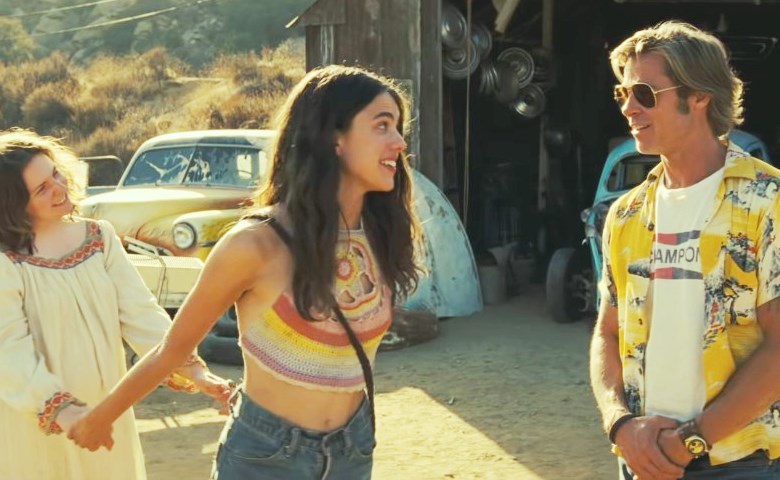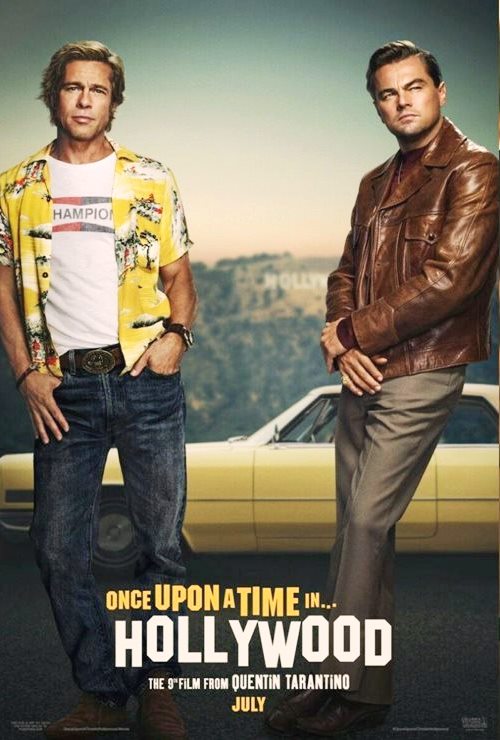
Quentin Tarantino’s skill is too pruned and too precise to not make an interesting picture, a compulsively entertaining one and the freedom to make an eccentric one. Once Upon a Time in Hollywood is a supremely textured throwback that resurrects the drive-ins, the muscle cars, the nighttime hot spots, the Dirty Mary’s with extra long celery sticks, the suede threads, the pom-poms and the Playboy Mansion as go-go dance rave of its’ 1969 day. Margot Robbie has undergone the subject of controversy by not given much dialogue to work with, and I personally think it’s a splendid and deliberate choice: her character is blissed-out, too carefree to bother with mundane things that normal people fuss with. While most people blabber about (and there are some man-boys in this film that do just that), she’s a character that doesn’t say anything that is remotely extraneous. She lives an envious, jaunty and joyful, as well as untouchable existence. We all look at Sharon Tate, and Margot Robbie herself, as someone we would yearn to have the slightest touch of karma with.
Brad Pitt is nonetheless the best actor, to me, of this entire show. As stuntman Cliff Booth, he lives a complacent existence as a trailer home bachelor and gofer to his petulant actor boss Rick Dalton (Leonardo DiCaprio). When an actor on the set like Bruce Lee gets a little haughty about his work (isn’t it possible Bruce Lee, or any overpaid actor of any era, would get a little bigheaded once in awhile?), Cliff smirks and thus provokes the Green Hornet star, culminating in a fight of east vs. west if you want to be rude about it. But more so, it’s really a fight though of an underpaid stuntman as a real man vs. prima donna of Hollywood.
There’s a shaky, queasy-inducing sequence, with Cliff finding himself amongst hippies at Spahn Ranch. He has no clue, not hindsight yet, that they are Manson’s hippies. Cliff merely wants to say hello to an old acquaintance named George and see if he’s alright, and not being taken advantage of by a web of dope junkies. Little by little, Cliff recognizes that these dope junkies are a little more dangerous than your usual troupe, a little more unhinged. And so he has to stick out his verbal authority on the situation so he can get to see George who is played by the curmudgeon Bruce Dern. You half-wait for Cliff to be stabbed in the back at some point.
DiCaprio gets some standout spotlight acting opportunity in Tarantino’s ode to yesteryear, to me he’s never better when he has to do a bad version of Steve McQueen in “The Great Escape,” yet he’s trying to be good at doing the character Hilts, the character McQueen classically and ultimately got to play. It’s screw-loose metaphysical acting at its best. Essentially though, DiCaprio’s character is manifest in old school egomania. DiCaprio has a trailer break tantrum on the set of “Lancer,” a square TV western that wants to be hip, and he beats on his own soul so he can go out there and be an actor who is better than the rest. After some quite lengthy (maybe draggy and indulgent) drama that QT has written for DiCaprio’s Rick Dalton, he gets a smashing scene where he goes and out-performs everyone else for his guest starring role that goes beyond the requirements for archaic 1960’s TV westerns, a genre that would soon in a few short years be dead to general audiences.
But through this whole time we are mentally preparing for the Sharon Tate and Jay Sebring murders, and the fates of the housemates that were with them, and how Quentin Tarantino is going to handle all that? And when it comes, it is at first so abrupt and nonconformist it is shocking. It’s so methodically staged according to Tarantino’s own brand of devilry, that our heads our swirling as to, in the moment, why did he choose to do it that way? I will choose this time to object that the Manson family as they are presented at large, are too guileless, a bunch of drag-puffing, slumming devil’s rejects who come off a bit shy of true menace. But I did find Margaret Qualley exceptional, as the “free spirit” Manson girl who will do anything if it feels good, who earlier in the film hitches a ride with Cliff.
Tarantino has us thankful in a way, he’s able to bring us wish fulfillment synchronously alongside the gasping sight of carnage. But while he had us in his clutch, he is also letting us off the hook, too. In 1969, two eras were at a clash – the ethereal classic Hollywood that was dying vs. post-Manson anarchy that would rattle the sanctity of, well, everything – and he jettisons tackling that potential revelation for sake of flashing off his own id.
Tarantino though has such exuberant power in his own storytelling methods that I knew going in he’d be one of the few filmmakers that could jerk me around and get away with it.
160 Minutes. Rated R.
HISTORICAL FICTION / ADULT ORIENTATION / FOOD FOR THOUGHT
Film Cousins: “Once Upon a Time in the West” (1969); “The Player” (1992);
“Hollywoodland” (2006); “Hail, Caesar!” (2016).






Recent Comments
rudolfmenon Says,
Totally agree. And we left the cinema really disappointed.
rudolfmenon Says,
Really? Wow, then im going to watch this! I could watch District 9 ...
soulreaver99 Says,
The trailer to the movie itself was half-assed. Totally not surprising that ...
hashbrowny Says,
Great family movie...I disagree with your view. Maybe you've lost your ...
calipoppy Says,
Man of Steel is a Hunk of Kryptonite.I enjoyed the movie.